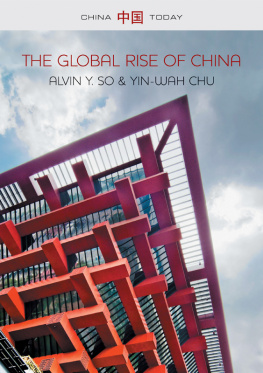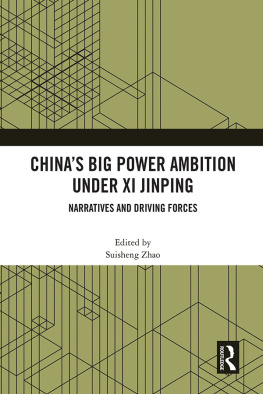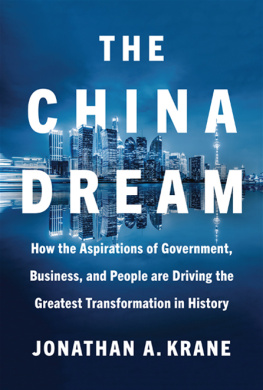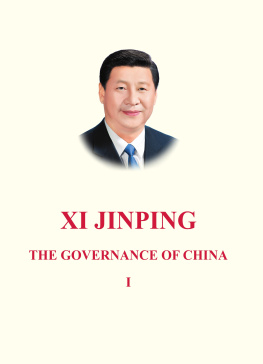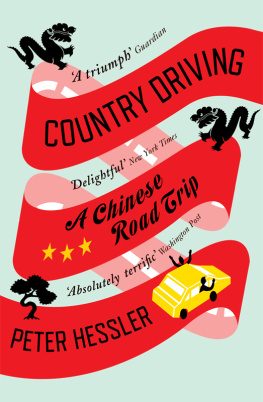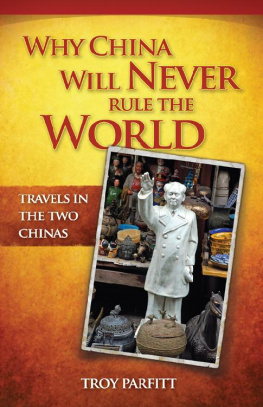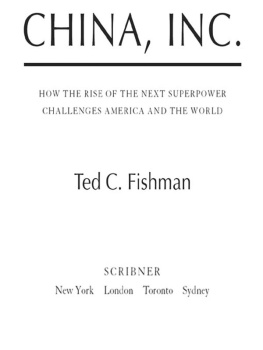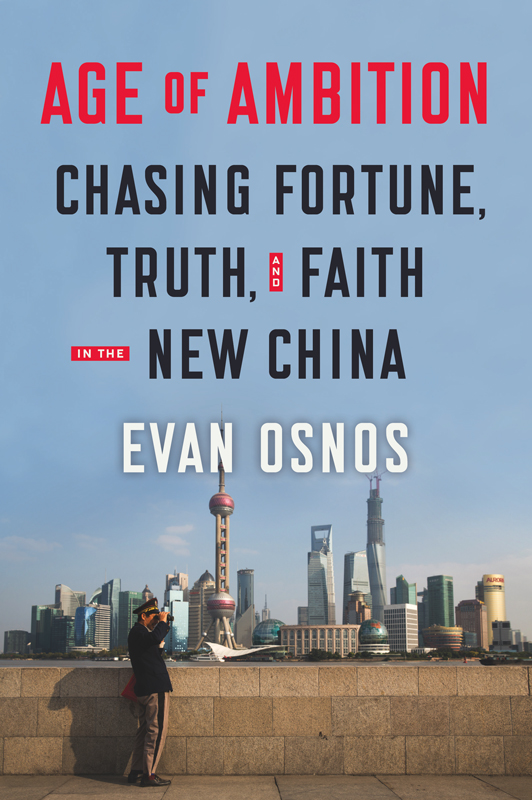Contents
Guide

The author and publisher have provided this e-book to you for your personal use only. You may not make this e-book publicly available in any way. Copyright infringement is against the law. If you believe the copy of this e-book you are reading infringes on the authors copyright, please notify the publisher at: us.macmillanusa.com/piracy.
To Sarabeth,
who lived it all
CONTENTS
Why should I be like everyone else, just because I was born to a poor family?
Michael Zhang, teacher
The commander of a mighty army can be captured, but the aspiration of an ordinary man can never be seized.
Confucius
PROLOGUE
Whenever a new idea sweeps across Chinaa new fashion, a philosophy, a way of lifethe Chinese describe it as a fever. In the first years after the country opened to the world, people contracted Western Business Suit Fever and Jean-Paul Sartre Fever and Private Telephone Fever. It was difficult to predict when or where a fever would ignite, or what it would leave behind.
In the village of Xiajia (population 1,564) there was a fever for the American cop show Hunter , better known in China as Expert Detective Heng Te . When the show appeared on Chinese television in 1990, the villagers of Xiajia started to gather to watch Det. Sgt. Rick Hunter of the Los Angeles Police Department go undercover with his partner, Det. Sgt. Dee Dee McCall. And the villagers of Xiajia came to expect that Det. Sgt. Rick Hunter would always find at least two occasions to utter his trademark phrase, Works for methough, in Chinese, he came across as a religious man, because Works for me was mistranslated as Whatever God wants. The fever passed from one person to the next, and it affected each in a different way. Some months later, when the police in Xiajia tried to search the home of a local farmer, the man told them to come back when they had a warranta word he had learned from Expert Detective Heng Te .
When I moved to China in 2005, I was accustomed to hearing the story of Chinas metamorphosis told in vast, sweeping strokes involving one-sixth of humanity and great pivots of politics and economics. But, up close, the deepest changes were intimate and perceptual, buried in daily rhythms in ways that were easy to overlook. The greatest fever of all was aspiration, a belief in the sheer possibility to remake a life. Some who tried succeeded; many others did not. More remarkable was that they defied a history that told them never to try. Lu Xun, Chinas most celebrated modern author, once wrote, Hope is like a path in the countryside: originally there was no path, but once people begin to pass, a way appears.
I lived in China for eight years, and I watched this age of ambition take shape. Above all, it is a time of plentythe crest of a transformation one hundred times the scale, and ten times the speed, of the first Industrial Revolution, which created modern Britain. The Chinese people no longer want for foodthe average citizen eats six times as much meat as in 1976but this is a ravenous era of a different kind, a period when people have awoken with a hunger for new sensations, ideas, and respect. China is the worlds largest consumer of energy, movies, beer, and platinum; it is building more high-speed railroads and airports than the rest of the world combined.
For some of its citizens, Chinas boom has created stupendous fortune: China is the worlds fastest-growing source of new billionaires. Several of the new plutocrats have been among the worlds most dedicated thieves; others have been holders of high public office. Some have been both. For most of the Chinese people, however, the boom has not produced vast wealth; it has permitted the first halting steps out of poverty. The rewards created by Chinas rise have been wildly inconsistent but fundamentally profound: it is one of the broadest gains in human well-being in the modern age. In 1978, the average Chinese income was $200; by 2014, it was $6,000. By almost every measure, the Chinese people have achieved longer, healthier, more educated lives.
Living in Beijing in these moments, I found that confidence in ones ideas, especially about Chinas future, seems to vary inversely with the time one spends on the ground. The complexities blunt the impulse to impose a simple logic on them. To find order in the changes, we seek refuge, of a kind, in statistics: in my years in China, the number of airline passengers doubled; cell phone sales tripled; the length of the Beijing subway quadrupled. But I was less impressed by those numbers than by a drama that I could not quantify: two generations ago, visitors to China marveled most at the sameness of it all. To outsiders, Chairman Mao was the Emperor of the Blue Ants, as one memorable book title had ita secular god in a land of matching cotton suits and production teams. Stereotypes about the Chinese as collectivist, inscrutable drones endured in part because Chinas politics helped sustain them; official China reminded its guests that it was a nation of work units and communes and uncountable sacrifice.
But in the China that I encountered, the national narrative, once an ensemble performance, is splintering into a billion storiesstories of flesh and blood, of idiosyncrasies and solitary struggles. It is a time when the ties between the worlds two most powerful countries, China and the United States, can be tested by the aspirations of a lone peasant lawyer who chose the day and the hour in which to alter his fate. It is the age of the changeling, when the daughter of a farmer can propel herself from the assembly line to the boardroom so fast that she never has time to shed the manners and anxieties of the village. It is a moment when the individual became a gale force in political, economic, and private life, so central to the self-image of a rising generation that a coal miners son can grow up to believe that nothing matters more to him than seeing his name on the cover of a book.
Viewed one way, the greatest beneficiary of the age of ambition is the Chinese Communist Party. In 2011 the Party celebrated its ninetieth birthdaya milestone unimaginable at the end of the Cold War. In the years after the Soviet Union collapsed, Chinese leaders studied that history and vowed never to suffer the same fate. When Arab dictatorships fell in 2011, Chinas endured. To survive, the Chinese Communist Party shed its scripture but held fast to its saints; it abandoned Marxs theories but retained Maos portrait on the Gate of Heavenly Peace, peering down on Tiananmen Square.
The Party no longer promises equality or an end to toil. It promises only prosperity, pride, and strength. And for a while, that was enough. But over time the people have come to want more, and perhaps nothing more ardently than information. New technology has stirred a fugitive political culture; things once secret are now known; people once alone are now connected. And the more the Party has tried to prevent its people from receiving unfiltered ideas, the more they have stepped forward to demand them.
China today is riven by contradictions. It is the worlds largest buyer of Louis Vuitton, second only to the United States in its purchases of Rolls-Royces and Lamborghinis, yet ruled by a Marxist-Leninist party that seeks to ban the word luxury from billboards. The difference in life expectancy and income between Chinas wealthiest cities and its poorest provinces is the difference between New York and Ghana. China has two of the worlds most valuable Internet companies, and more people online than the United States, even as it redoubles its investment in historys largest effort to censor human expression. China has never been more pluralistic, urban, and prosperous, yet it is the only country in the world with a winner of the Nobel Peace Prize in prison.


